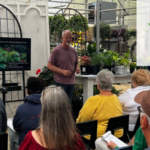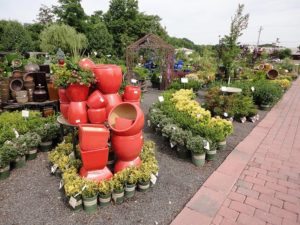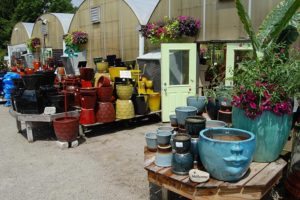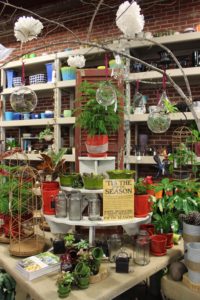You Don’t Own the Customer…The Customer Owns You
Those of you who know me, have read my column or heard me present at industry forums get the sense that I’m just a bit passionate about changing the way our industry thinks about who our customer really is.
I want us to change from a supply chain mentality, where production drives what we offer to the end consumer, to a demand chain mentality, where we start with what the consumer wants and work backwards to develop programs, products and services that satisfy her needs and expectations. I want us to change from a “selling” focus to a “marketing” focus. “Selling” is the activity of eradicating inventory you already own or that you want to sell. “Marketing” is a process of identifying the end-user’s needs and expectations and using this to drive production and program development.
I want us to stop viewing the various categories of floriculture cut flowers, bedding plants, foliage plants, etc. as competing with each other. Our consumer doesn’t differentiate floriculture by category; she looks at our industry as a total entity of beautiful plants and flowers. Most of our consumers can’t tell the difference between a perennial and an annual (and frankly, neither can I, especially when the same plant can be an annual in Minnesota and a perennial in southern California)… and that’s okay, as long as they buy something that appeals to them. It’s our responsibility to provide the information that allows the consumer to plant and maintain the product for her maximum enjoyment and success.
I want us to stop focusing on the other retail channels as our competition, with florists saying that the supermarkets are the enemy, the discounters saying the home center chains are stealing their market share and the independent garden centers saying warehouse clubs are hurting their hardgoods sales.
I want us to start recognizing that our industry is losing market share to the other category choices; whether it’s candy or lingerie or a weekend away, all are viable alternatives to flowers and plants as gifts. And don’t forget the competition from permanent silk or artificial plants and flowers for home decorating rather than using live product.
We waste more energy and effort trading customers and swapping existing market share between garden centers than we do trying to increase consumption and create demand. By figuring out how, as an industry, we can more effectively compete with the other non-floral consumer alternatives, we can make the pie bigger for all of us. And, no, I’m not suggesting a marketing order is necessary to help change direction (though that would be the right thing to do, it won’t happen in my lifetime), but clearly, some fundamental changes are needed in the way we are currently defining our competition.
How to Change
I want us to start funding research into consumer behaviors and to start using available research such as the American Floral Endowment’s Consumer Tracking Study to help develop products, programs and services that will better allow us to compete for the consumers’ dollars, time, emotions and minds. Don’t get me wrong… production research to grow crops more efficiently and more disease- and pest-resistant are essential, but how much of this research translates into real benefits to our consumer, the only one who ultimately really counts for all of us? Has this production research made the consumer enjoyment period longer, reduced the care and maintenance required, saved time for the consumer, extended the season, put the fragrance back into flowers… all things that provide compelling reasons to buy our products rather than some other, non-floral category products.
I want us to change from doing things for our own convenience and start benefiting from doing things for the convenience and benefit of our consumer. Sure it’s important to become more efficient at controlling costs, but if the changes needed to achieve these efficiencies compromise the consumer experience, what was really accomplished? If we improve our operations and become more efficient, and it doesn’t create more consumer demand, was it really worth the effort?
I want us to promote the true benefits of our industry’s products and services to the consumer the enjoyment, satisfaction, peace of mind, well-being and emotional impact plants and flowers provide. These are things that the alternative choices to floriculture can’t provide, and they are compelling reasons to buy our products. Much too often, we’re still selling “stuff” at a price, and a price/value war against the alternative category choices is not one that we can win consistently. Our products offer both real and perceived non-price value benefits to the consumer that position us very favorably against the competitive categories, but for some unfathomable reason, we’re afraid to capitalize on them (other than the fear of changing the way we’ve always done things).
Dr. Don Schultz, professor emeritus at Northwestern University, recently made some comments in 1 to 1 magazine on the subject of change and the importance of focusing on the customer. He challenged the “old” mindset of “what’s good for us is good for our customers” by saying that none of the new marketing approaches, logistics and distribution system improvements or management tools “will be worth very much until we realize that we do not and will not own the customer, the relationship, the respect nor the income flows that come from the customer unless and until we learn to manage demand, not just supply. It’s the customer who determines value, not the marketer [or retailer, or grower]. It’s the customer that drives yield management, not the supplier… The customer owns the marketer today.”
We live in a new world: a world that revolves around demand how to create customer demand, grow and cultivate customer demand, meet customer demand, improve customer demand. These are the true issues our industry faces.
The potential for growth and success for us are real. Hopefully, we, as an industry, can meet the challenges of what the consumer will demand in today’s changing marketplace.


















 Videos
Videos





